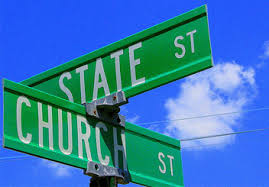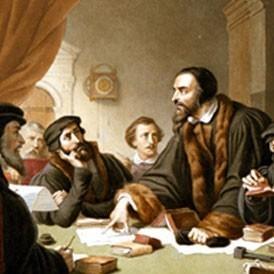This is the third in a four-part series, “Putting the ‘Calvin’ back in Calvinism.”

Calvin’s understanding of the relationship between church and state has been one of the most controversial parts of his theology. In part, that controversy arises from Calvin’s own seemingly dissonant efforts to clearly distinguish theologically between the authority of the church and state while, in practice, the relationship between the Genevan consistory and the Genevan government was murky and often overlapping.
Here, too, the trajectory of Neo-Calvinism complicates matters as various strands of Calvinism, most notably Kuyperians, have sought to emphasis Calvin’s ideas about the Lordship of Christ over all things, including politics. Thus, the “two kingdoms” scholarly debate continues in Calvin studies, and the theological implications of how Calvin and Calvinists see the relationship between church and state continue to play out in real time in the United States but also around the globe in places like Brazil, Zambia, and Hungary.
Even if settling any entrenched debates in a short blog post is unlikely, turning to Calvin’s own words, limited here to various sections of the Institutes, can help reorient us. Calvin’s view of the Church is a crucial part of his theology and of how he conceives of the Christian life. If nothing else, the very structure of the Institutes demonstrate that—the subject of Book IV is the Church, and 19 of the 20 chapters in Book IV are devoted to the Church with the final chapter addressing the civil government. Book IV is also significantly the longest of the four books. In both its visible and invisible forms, Calvin loved the Church.
Calvin follows the Christian tradition in using the language of “Church as Mother” (IV.1.4.) and is clear that there is no salvation outside the Church. That’s a complicated theological subject for Calvin, since his theology intentionally sets him outside the Catholic Church. We will have to leave that aside for now, but what is significant for Calvin is that the Church’s power, or jurisdiction, is distinctly spiritual. Calvin is explicit (IV.11.1): “So the Church of God needs a kind of spiritual government. This is altogether distinct from civil government.” Calvin draws the distinction again as he broaches civil government. Again, he writes (IV.20.1), “Having shown above that there is a twofold government in man, and having fully considered the one which, placed in the soul or inward man, relates to eternal life, we are here called to say something of the other, which pertains only to civil institutions and the external regulation of manners.”
Calvin’s understanding of the relationship between Church and state is complicated by at least two factors. First, and not at all uniquely, Calvin saw it as the responsibility of the government to “foster and maintain the external worship of God [and] to defend sound doctrine and the condition of the Church,” among other things related to proper civil life. The duty of civil magistrates extends to “both tables of the law,” Calvin writes, meaning the government should not only regulate things like murder and stealing, but also the Sabbath and idolatry. The lines between the “two kingdoms” Calvin articulates quickly seem quite blurry.
Second, Calvin understood both the Church and the state as responsible for overseeing morality. The Church’s oversight of discipline was under the purview of the pastor and elders, combined jointly in Geneva’s consistory. Reading those records shows the Genevan consistory disciplining and resolving everything from domestic disputes to attendance at worship services to sexual offenses. However, the consistory could not impose physical punishments and relied on the Genevan government to do so. Thus, the consistory frequently passed on offenders to the city government to pursue civil punishments. Unsurprisingly, disputes between the two over what offenses were properly the domain of each body were frequent and uneasily solved, often to Calvin’s frustration.

Perhaps Calvin’s own ambiguity regarding the relationship between Church and state resonates with many of our own current contexts and wonderings. Many Christians, including Reformed Christians, can see the obvious dangers today of merging the civil government of the state with the spiritual government of the Church. Few Christians, I think (?), desire to live in a country in which the government levies fines for missed church attendance or imprisons those advocating for worshipping other gods. On the other hand, many Christians see benefits in the government working to align itself with Christian morality in seeking to rid a country, maybe even through civil laws, of pornography or corporate greed or environmental abuse. Put differently, if Christianity truly offers a vision of the good life, to what extent should the civil government seek to enforce that good life, and when is the civil government legislating morality or even piety overreaching?
In seeking a way forward, I humbly suggest two prompts for consideration. First, particularly in light of recent interest in Christian nationalism and given Neo-Calvinism’s prominence in such movements, Calvin’s “two-kingdoms” ideas should give Reformed Christians serious pause as to the limits the Church should play in any civil government. The Church’s jurisdiction is spiritual, Calvin warns, and any attempt to impress that spiritual kingdom onto the civil government is improper, disorderly, and dangerous. May all of us who claim Calvin’s name in some way, shape, or form heed his cautions.
Second, Calvin’s closing of the Institutes reminds Christians that our ultimate allegiance is not to any state but, rather, to God. Calvin acknowledges that it will not be easy to know when following God (what he calls “piety”) will demand resistance to governing authorities and when Christians should submit to legitimate authorities. Those determinations will take wisdom.
In the face of such decisions, Calvin highlights the necessity of courage. Courage is required when Christian piety demands resisting a government or leaders who lead us to go against God. In the same way, courage is needed when Christian piety requires us to submit to rulers, even when they act cruelly and unwisely. Christians can live courageously in the world, whether that requires painful submission or active resistance, precisely because we are members of Christ’s spiritual kingdom. Even if Calvin himself struggled to wisely find the balance, maybe Calvin can help us as members of the Church, the spiritual body of Christ, to live wisely and courageous in the civil realms we inhabit without equating the two.


One Response
A really helpful meditation on this vexed question.